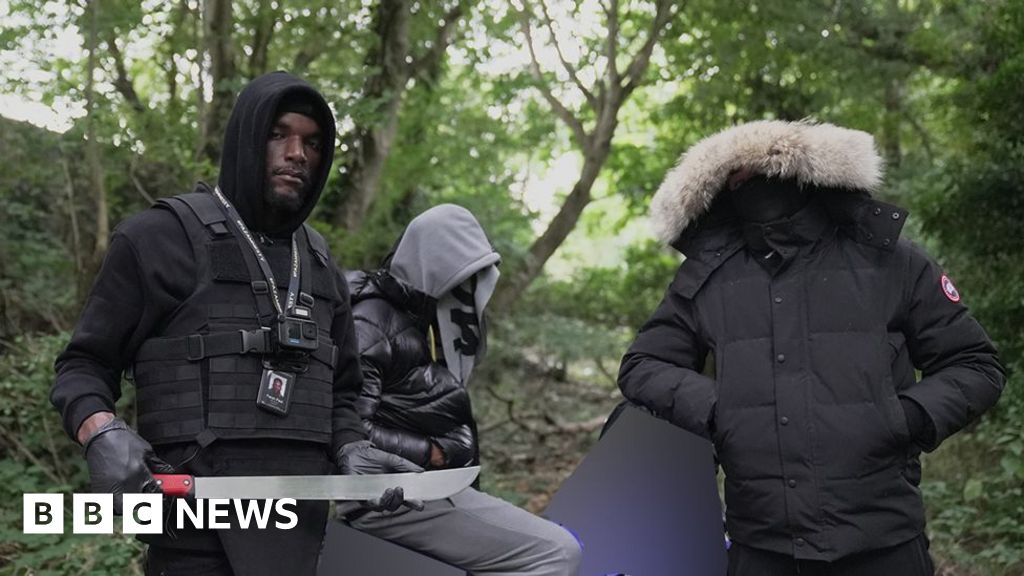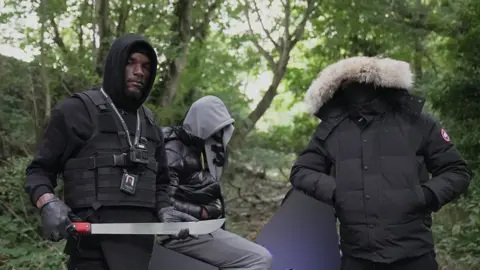 BBC
BBCBuying a zombie knife is as easy as getting a takeaway delivery, says Matthew, 20. He got his first blade, a Rambo-style knife, aged 16.
On a quiet country lane south of Luton, Matthew – which is not his real name – says “everyone” walks around with one.
“They feel like they need to,” he says, behind a balaclava pulled over his face. “If you have a flick knife and someone pulls a Rambo out on you, then you’re going to be thinking ‘why don’t I get a bigger one?’
“If you’ve got the bigger weapon, you’ve got more of a chance. If my knife is bigger than theirs, I’m going to win.” But Matthew says he’s ready to hand it in.
“You grow up… I realise it ain’t worth it, I’ve lost people.”
From Tuesday, it will be illegal to possess “zombie-style” knives and machetes in England and Wales.
The new legislation will close a legal loophole and make it an imprisonable offence to own, make, transport or sell a wide range of what are called “statement” knives favoured by criminal gangs.
Zombie-style knives and machetes are defined as weapons with blades over eight inches (20cm) in length, normally with a serrated cutting edge.
An amnesty and compensation scheme has been running to encourage people to surrender their weapons ahead of the ban.
‘I see lots of Rambo and zombie knives’
But Matthew isn’t handing his machete to the police. Instead he’s giving it to a man called Faron Paul, an anti-knife campaigner who runs a weapon amnesty company.
Faron knows only too well the devastating impact of knife crime. He nearly lost his life after being stabbed. Now he travels around the UK collecting hundreds of knives from people who want to get rid of them. They are then either handed to the police or incinerated.
“I see a lot of Rambo knives and zombie knives,” he tells BBC News. “They are the most common knives that I see. It’s hard to keep up with all the messages I get, from all around the UK.”
Faron, who has been operating his amnesty service since 2018, says the knives are getting bigger and bigger.
Figures gathered by the BBC suggest large blades are also being recorded in more and more crimes by police.
The number of recorded crimes that mentioned machetes, swords or zombie knives has almost doubled in five years, figures obtained using Freedom of Information requests indicate.
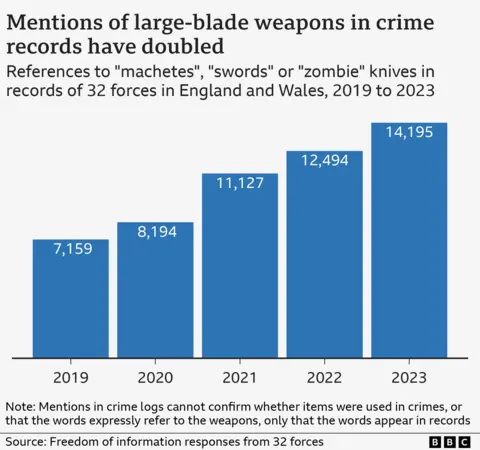
In 2023, these kinds of large, bladed weapons were mentioned in more than 14,000 crime logs, according to data from 32 police areas in England and Wales.
Machetes alone make up almost 10,000 of these – double the number from five years earlier.
However, while zombie knives and other large knives are part of the new ban, it doesn’t include all swords.
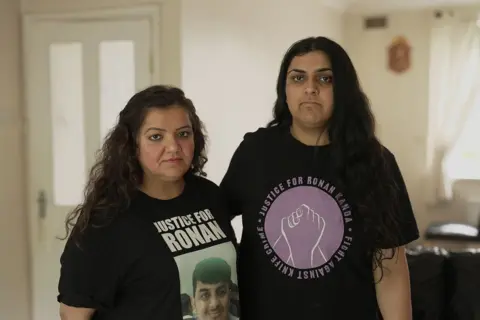
Ronan Kanda, 16, was murdered in a case of mistaken identity just yards from his family home in Wolverhampton in June 2022.
Ronan’s mother Pooja Kanda says she wants the online sale of all big knives banned.
“It was a sword that went through my child’s heart. I am shocked they were available when this happened. And I’m more shocked that they are still continuing to be available after what happened to Ronan.”
The government’s “homicide index“ started recording the type of blade involved in murders and other killings in April 2022. It has published only one year’s worth of data so far.
It reveals 244 homicides in England and Wales involved sharp instruments in the year ending March 2023.
Of these, 14 involved machetes, seven involved zombie knives and three involved swords. Kitchen knives were the most common type of sharp instrument used to kill. They were used in 101 homicides.
Ronan’s sister Nikita says young people are increasingly attracted to bigger knives.
“It’s about the culture that surrounds the sale of machetes, zombie knives and swords and stuff like that.”
She says the teenager who murdered Ronan was “enticed” by big zombie knives with curved edges and “stupid, silly, writing on them”.
“The stuff that’s actually in fashion now,” she adds. She blames the availability of the weapons online.
Back in south London, Faron is on his way to collect two machetes from a 21-year-old man who says he bought them after being kidnapped and stabbed 12 times.
Jon (not his real name) was attacked in 2022 by former school friends who he says wanted money.
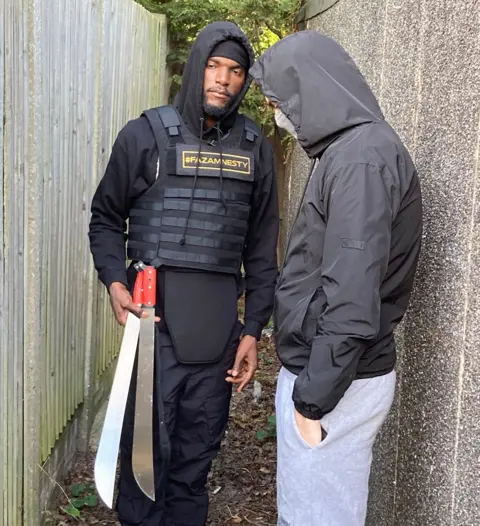
“I was on my way back from the shop at night and they took me to a field,” Jon says. “They wanted me to tell them where my money was. I think the reason they thought I had money was because of my Instagram.
“Someone slashed a machete through my arm,” he says. “The knife stabbing on my thigh was only about an inch away from hitting a major blood supply, so it could’ve been bad.”
After the attack, Jon says he decided to get “something the same size” to protect himself but feels it’s no longer necessary.
Many of the knives Faron collects are now so big they don’t fit into amnesty bins, which have been dotted around police stations in London.
Even with the ban coming into force and the recent amnesty, he says it is often too hard for some people “to do the right thing”. Many young people are scared to hand in knives at police stations, he adds.
Jon’s is one of dozens of knives Faron has collected in recent weeks.
The Home Office said in addition to Tuesday’s new knife legislation, there was a plan to ban ninja swords.
The government has also commissioned a review of how knives are sold online, which will be carried out before the end of the year.
“It will identify any gaps in legislation around how these weapons are attained illegally online,” the Home Office spokesperson said.
For Jon it was “easy” to buy his “statement” knives online.
“They were the cheapest thing online. There were no ID checks. I did what I felt was necessary.”

